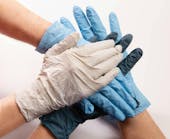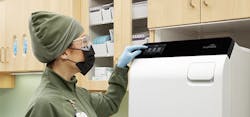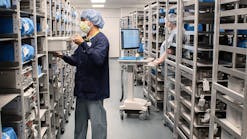Hand hygiene is the most important step healthcare workers can take to protect themselves and others from the spread of infection. Handwashing is a regulatory requirement that is clearly addressed in standards and guidelines, and healthcare organizations have strict policies that govern how employees wash their hands. Many facilities have dedicated handwashing officers or champions (infection preventionists, registered nurses or quality control officers, for example) who help promote handwashing and monitor compliance. These handwashing leaders are sometimes part of the orientation process for new employees, including those working in the Sterile Processing Department (SPD).
Many hospital hand-hygiene policies are generally written with direct patient contact as the main focus for identifying when handwashing or hand sanitizing should occur. Still, it is also important to understand the risks associated with healthcare workers who are not in direct patient contact. Consider, for example, an SP technician who will never physically touch a patient with their hands, but whose hands must touch surgical devices throughout each reprocessing step. Those devices then come in direct contact with the patient.
SPDs have a unique and diverse workflow—decontamination, high-level disinfection, preparation and packaging (prep & pack), sterilization, case carts, and distribution—with some steps at higher risk for spreading infection. The workflow requires critical thinking when considering the appropriate moments and instances when proper handwashing or hand sanitizing should occur. When developing an SPD hand-hygiene program, collaboration between SPD leaders and the hospital’s IP department is prudent.
A key advantage for SP leaders is that Sterile Processing Week and Global Handwashing Day align closely in October. SP Week begins the second Sunday of October, and Global Handwashing Day falls on October 15. Because handwashing and device processing share a distinct goal of infection prevention, I recommend SP leaders build handwashing education and helpful process reminders into their SP Week event planning.
Improvement opportunities abound
The Joint Commission’s 2023 National Patient Safety Goal, Prevent Infection (NPSG.07.01.01), states to “Use the hand cleaning guidelines from the Centers for Disease Control and Prevention (CDC) or the World Health Organization (WHO).” The CDC also provides educational resources to help healthcare professionals develop and implement a hand-hygiene program. One resource is the CDC’s Hand Hygiene in Healthcare Settings video series. SP leaders and IPs seeking to assist SPDs with a hand-hygiene program may find the CDC’s “4E’s of an Effective Hand Hygiene Program” helpful with specific tips and best-practice recommendations. The 4 E’s stand for Engage, Educate, Execute and Evaluate. The course can be accessed at www.cdc.gov/handhygiene/providers/training/index.html.
An effective way to eliminate handwashing barriers is to prominently post the phone number employees should call whenever handwashing dispensers are empty or malfunctioning. It is also vital that SP leaders empower their technicians by listening, acknowledging, and immediately acting on handwashing barriers, especially in high-risk areas like decontamination. This simple action can help employees feel more empowered and engaged with handwashing practices.
After a successful handwashing engagement plan is implemented, education is imperative, beginning with a review of the hospital’s current handwashing policy and then ensuring all SP employees understand what is expected. Education provides another opportunity to partner with the hospital’s IPs and identify when hand hygiene should be performed in the SPD. Education should demonstrate the proper way to use certain soap and or sanitizer dispensers. Note: The “Educate” video in the 4E series explains the CDC guidelines for when to wash hands and how to use soap and water versus hand sanitizer. For example, the video teaches that if hand sanitizer dissolves within 15 seconds of rubbing one’s hands, there was an insufficient amount of sanitizer to perform proper hand hygiene.
Effective, ongoing feedback should be solicited and shared respectfully, without punitive risk to those who provide information, including about non-compliance incidents. The 4E “Execute” video addresses the importance of mindfulness and team accountability. SP leaders must continuously share the goal of handwashing and create a culture of accountability where continuous quality improvement is embraced. Monitoring, collecting, and analyzing data from handwashing processes can help healthcare leaders better understand what needs to improve to keep healthcare workers and patients safe. The “Evaluate” video in the 4E series evaluates hand-hygiene compliance, including direct overt observation, covert observation, and automated data collection. Direct overt is when the person being evaluated understands they are being observed; covert is when the person being evaluated is unaware they are being observed.
Automated data collection can be added to an SPD instrument-tracking system, so when an SP technician logs into a particular workflow process, the tracking system can automatically prompt them to wash their hands (and the technician can document their compliance). The “Evaluate” video describes routine evaluations of sinks and dispensers where data can also be collected to show barriers to handwashing compliance (e.g., the hand sanitizer that doesn’t dispense enough sanitizer for proper hand hygiene). Regardless of the evaluation process, sharing the data is essential for maintaining employee engagement, demonstrating compliance, and facilitating continuous process improvement.
Conclusion
Implementing a hand-hygiene program in the SPD can be a complex process. Collaborating with infection preventionists can help identify high-risk workflows and identify appropriate moments to perform hand hygiene throughout the various areas of the department. Using resources, such as the CDC’s “4E’s of an Effective Hand-Hygiene Program,” can simplify the education process by helping SP leaders understand and comply with the department’s hand-hygiene policies.

Monique Jelks | Educational Consultant
Monique Jelks, MSOL, BA, CRCST, serves as System SPD Educator for Wellstar Health System in Metro Atlanta. She also serves as President on the HSPA Board of Directors.





